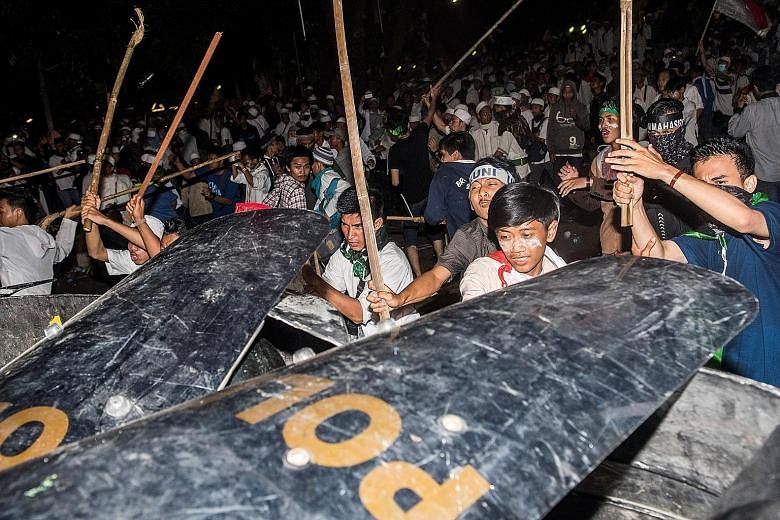President Joko Widodo is postponing his state visit to Australia today, as the spillover effect of last Friday's mass protest in Jakarta threatens to divide his country.
More than 100,000 Muslim protesters took to the streets of the city against Governor Basuki Tjahaja Purnama, accusing him of insulting Islam and demanding that he be sacked and jailed.
It was the largest public demonstration seen in the capital since the 1998 race riots. But relative peace had returned to the city by mid-day yesterday.
Mr Basuki, a Chinese Christian, is standing for re-election in February and is competing with two prominent Muslims for the job.
"Current development has required the President to stay in Indonesia," the Foreign Ministry said yesterday, without elaborating.
Mr Joko had planned to use his three-day visit to Australia to cement improving ties. Observers said they were not surprised with his decision, especially after protesters reacted angrily over not being granted an audience with him.
Instead, they met Vice-President Jusuf Kalla, who failed to quell their anger, despite promising to quickly complete investigations into the allegations that Mr Basuki insulted the Quran.
While the target of the mob was Mr Basuki, they later turned on the President, demanding that he, too, be removed for his "inaction" against the governor, a close ally.
Although the demonstration was led by the hard-line Islamic Defenders Front, there remain strong suspicions it was backed by political opponents of the governor and the President, said political experts such as Dr Leo Suryadinata, a visiting senior fellow at the Iseas - Yusof Ishak Institute.
He said the "counter-elites", or rivals who did not benefit from Mr Joko's presidency, may have bankrolled the protest, with an aim of destabilising the government.
Without naming anyone, Mr Joko in an address early yesterday morning blamed "political actors" for escalating the violence, adding that they had "taken advantage of the situation".
Mr Basuki is in a three-way fight against former education minister Anies Baswedan and former president Susilo Bambang Yudhoyono's son Agus Harimurti Yudhoyono.
Mr Anies is backed by the Gerindra Party, headed by former army general Prabowo Subianto.
Dr Yudhoyono last Wednesday angrily denied government allegation that he was behind the protest, while senior Gerindra members, including Deputy House Speaker Fadli Zon, were seen among the demonstrators.
"They are also thinking of the 2019 presidential election," said Dr Leo, referring to Dr Yudhoyono and Mr Prabowo, who ran against Mr Joko in 2014.
Political analysts, such as Mr Dede Utomo from Airlangga University, generally agree that if the gubernatorial election was meant to be a test of religious tolerance in Indonesia, then it failed on Friday.
"It is something that cannot be underestimated," he said, referring to the possibility of the President's rivals using race and religion to disrupt the country.
The police said more than 70 police officers were injured and 21 vehicles damaged.At least 25 protesters, including 10 suspected to have instigated the violence later that night after what was largely a peaceful rally, were also arrested.

